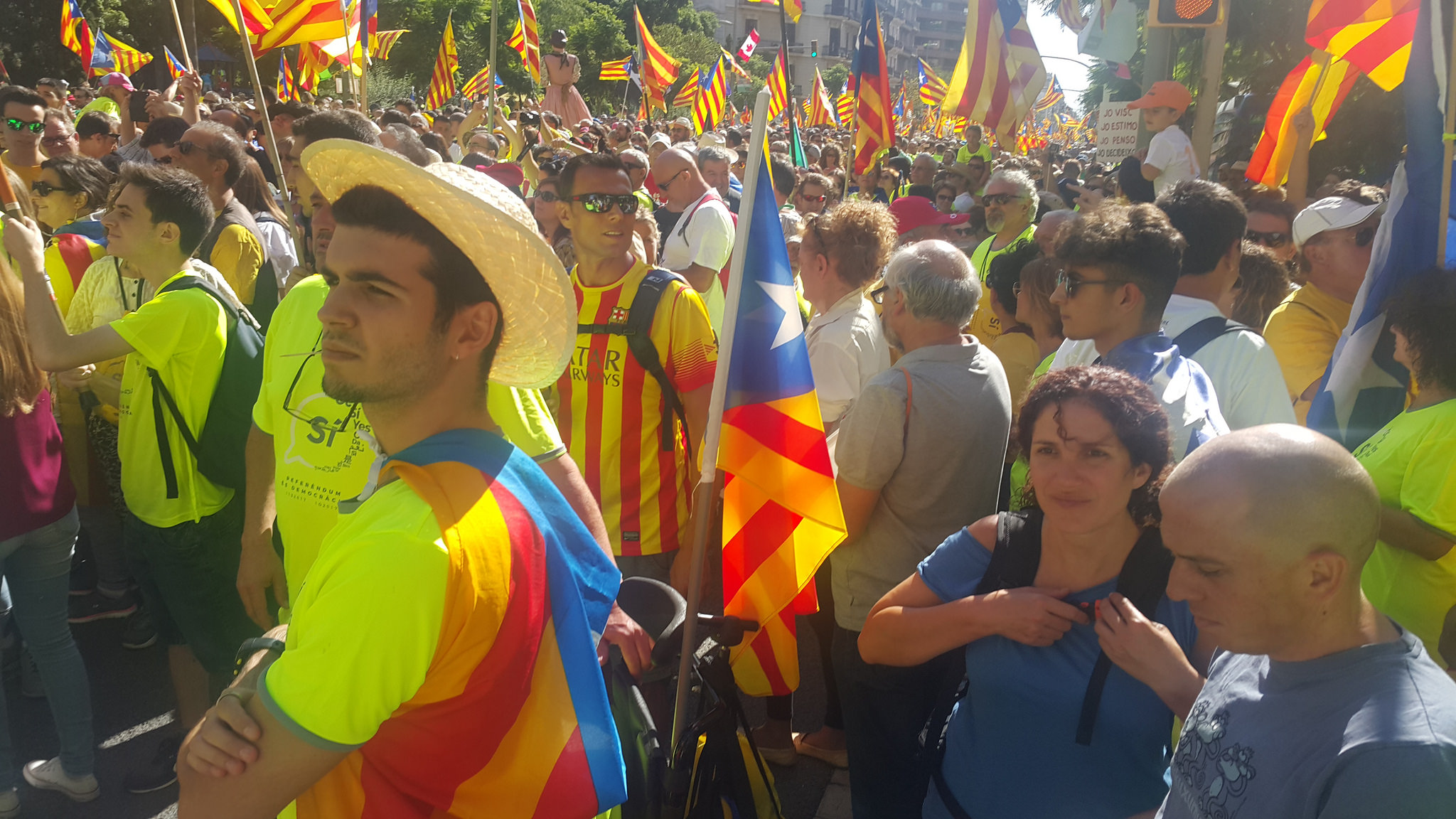Many declarations of independence are unilateral. But they also tend to be accompanied by violence. And they frequently fail.
Catalan President Carles Puigdemont is keeping Spain and the rest of the world in suspense as we wonder will he or won’t he pronounce Catalonia independent (or has he or hasn’t he already done so).
Surely part of what is on his mind is whether what Madrid (rightly) insists would be an extra-constitutional, and therefore illegal, declaration of secession could also be non-violent — or at least no more violent than what we have already seen with the intervention of the Spanish Guardia Civil on the streets of Barcelona during the putative referendum on Oct. 1. Catalans and Spaniards are now increasingly mobilized: so far, relatively peaceably, but for how much longer?
Equally, however, Puigdemont must be anxious about the declaration itself, which would have to summon up sovereign power at the moment of its enunciation. For the declaration to succeed, it would have to go beyond the easily falsifiable descriptive statement, “Catalonia is (already) independent.” After all, the entire basis of the nationalists’ disgruntlement is that it is not.
It would have to, instead, perform the change in state to which the description refers: “Catalonia is (now, with these words) independent.” And the success of such a performance depends less upon Puigdemont than upon his audience, who alone can grant his words the power they seek.
And who would recognize an independent Catalonia declared in this way? Not Spain, it seems. And surely no other member state of the European Union, either. Would Scotland? Kosovo? Northern Cyprus? A declaration of independence that falls on deaf ears is no declaration of independence at all.
No wonder Puigdemont is hesitating. Spain’s brinkmanship seems to be working. And even if talks between Barcelona and Madrid ensue, as they surely must, it is hard to see Spanish Prime Minister Mariano Rajoy giving much ground to the Catalan nationalists. He has little reason to do so.
Spain’s heavy-handed intervention against the referendum may have been counter-productive in Catalonia itself, where those wavering in their support for independence, or even outright opposed (still recently a majority of the population), were simply given another reason to support it. But such stern measures played well outside the region and especially among supporters of the ruling Partido Popular, who buy into the image of Catalonia as a rich region (with the highest GDP in the country and 16 per cent of Spain’s population) that simply refuses to share.
Hence the stand-off. For all the Catalan government’s attempts to dress the process up in the trappings of due process and consultation — and by contrast, the sight of armed Spanish police wresting ballot boxes out of people’s arms brought back memories of Francoist repression — any unilateral declaration of independence would necessarily be illegitimate. Meanwhile, opinions are polarizing, the sides are getting further apart and (further) violence is becoming more, rather than less, likely.
Whatever happens, the consequences and potential repercussions will be significant and widespread.
Were Puigdemont’s gamble to come off, this would pioneer what we might call a “Catalan Road to Independence.” It would also immediately create a problem for the Spanish state: if Catalonia, why not the Basque Country? Or even Galicia? Further abroad, the Scots, Belgian Walloons, and perhaps even Québécois sovereigntists would take heart.
But the Spanish state’s hard line, should it win out, hardly bodes well for the many kinds of political innovation at the level of region or municipality that have in recent decades challenged — or at least offered some kind of alternative to — the centralizing state not only in Barcelona but also (say) in England’s Merseyside, Italy’s Emilia-Romagna, or Colombia’s Medellin.
But is it this innovation and social creativity, the deservedly world-famous “Barcelona model” of regional and urban regeneration, that is at stake in the current push for independence? Is it this that is under threat, and that which the separatists wish to protect from Spain’s greedy hands? Or to put this another way: what exactly is the problem to which Catalan independence can now come to seem the solution?
The Barcelona model was developed and flourished with Catalonia as an autonomous community while remaining part of Spain. Indeed, the regeneration of the city dates to its successful campaign to host the 1992 Olympic Games, for which it was selected in 1986. This period saw the renewal of public spaces, construction of new urban hubs, and creation of civic centres and cultural institutions (among other measures), all with the aim, as architect Josep Maria Montaner observes, of “ensur[ing] a better quality of life for the city as a whole… to reinforce the feeling that every individual was sharing urban life; the feeling that everyone was taking part in the new city.”
If anything, as Montaner goes on to argue, the resistance to this development and democratization, unusual in the international context of the time, came not from Madrid but from the Catalan government itself, as part of a tension between a municipality governed by the left and a region in the hands of the right that ultimately abolished the metropolitan government altogether, in a move that had “an obvious parallel” in Margaret Thatcher’s abolition of the Greater London Council around the same time.
Barcelona and Catalonia as a whole are now suffering increasing unemployment, poverty, and social inequality, but in large part this is thanks to policies promoted by the Catalan government itself — a government that has (compared, say, to the devolved assemblies in Scotland or Wales) vast latitude to implement its own economic and social policies.
As the political scientist Vicenç Navarro observes, in the wake of the financial crisis of 2008 the Generalitat — the region’s government — slashed social spending as part of an austerity program that only made things worse for the majority of Catalans. Between 2010 and 2015, expenditure on basic provisions of the welfare state was reduced by 17 per cent, with cuts that were more severe than in any other Spanish region, or in any equivalent European nation.
As the writer Martín Caparrós notes, it was only then, faced with massive public protest against these cuts and the doctrine of austerity, that the regional government started to agitate actively for independence, pinning all the blame for Catalonia’s woes on Madrid.
In short, for Caparrós, much Catalan nationalism is stirred by political rhetoric reminiscent of the Brexit campaign in the UK or even Trumpism in the U.S.A.
This is surely not the impulse motivating all those who voted (or would vote) for independence. Again, if nothing else, Rajoy’s repression is providing new reasons enough for people to decide to split from Spain.
But Catalans should not be (literally) beaten into such short-term reactions. The attraction of nationalistic discourse is that it can attribute the region’s problems to outsiders and incomers, whether they be Spanish authorities, North African migrants or British tourists. But it may well be that the source of Catalonia’s problems lies within, and that independence, if it comes, will be no grand solution except in so far as it brings clarity and eliminates excuses.
The danger is that, perhaps Barcelona especially — that great Mediterranean port, a city state open to the world — comes to close in on itself, and loses all it has gained over the years since Spain’s transition to democracy.
One would like to believe that this thought is also giving Puigdemont pause, as he considers his options: that his problems would be only beginning once he declared independence and that, from then on, he would have nobody to blame but himself. ![]()
Read more: Politics
















Tyee Commenting Guidelines
Comments that violate guidelines risk being deleted, and violations may result in a temporary or permanent user ban. Maintain the spirit of good conversation to stay in the discussion.
*Please note The Tyee is not a forum for spreading misinformation about COVID-19, denying its existence or minimizing its risk to public health.
Do:
Do not: